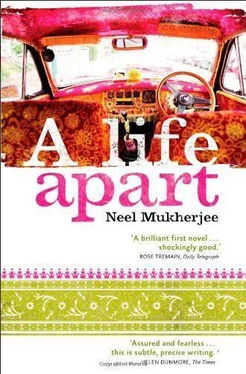‘Ooooh, how grand, how grand, a priest at fireworks. What fun. Do you have religious fireworks in India? You shall have to tell me all about it.’ She has been trying to get out of her battered armchair ever since she decided to punish the impudent Nicholas but hasn’t managed so far. She hopes that if she keeps on talking she can distract them from her failed attempts. And then, halfway through some boring old conversation about laundry and bedpan-cleaning and locking all the doors and not letting the cat out, she will rise like an elegant bird, all grace and brilliant plumage, and flit out in one seamless curve, out of the door, up the stairs, glide glide, swoop balletically into the bathroom and only after she has sat on the toilet will she let her bladder go. .
But, no, she is doing it now on her sofa, the hot, comforting trickle, the gathering wetness under and around her like a leaking amniotic sac; she hopes the men will not notice, or at least not until later, not until she has sat on her piss long enough for it to be absorbed by her skirt and the armchair cover and the thick cushions, but, oh dear, it has somehow managed to be rebellious and trickle over the edge and fall drop by drop at first and then in a halting dribble on to the carpet. She waits for a few seconds, debating whether she should draw attention to it and then has no choice but to ask that Nicholas over there to help her; at least he knows the ropes and where things are. No use fretting over spilt milk. Or spilt piss. She cackles out, ‘Spilt piss, ho ho ho ho, no use crying over spilt piss.’
The priest boy doesn’t seem to react to her words. He stands up, along with Nicholas, when she at last manages to do so herself. Nicholas comes forward to hold her hand and support her brittle steps, crooning, ‘It doesn’t matter, doesn’t matter at all. Now let us go upstairs gently, one step at a time, one step, one step.’
She feels irritated at being treated like an invalid; after all, she has only pissed herself, not fallen down the stairs and broken her hip or her neck or anything silly like that. She says, a shade too brusquely, ‘I know, I know. You know, I can climb the stairs on my own and wash myself and change into fresh clothes without your help,’ while clinging to his arm. She stresses the ‘your’ spite-fully as she strings out these lies. No use scaring off that pretty priest boy at the first meeting; he’ll find out what’s what soon enough. She is going to tell Nicholas that the boy can stay and have him explain things to him.
In her state, the only illusion she can hold on to is that she is letting the boy stay out of generosity, not necessity. As she and Nicholas shuffle out she marks that Nicholas doesn’t turn around to give the boy another significant look.
Almost the first thing Ritwik notices about Anne Cameron’s house is the decrepit state of its interior, as if everything in the house, all the objects and furniture and fittings are sliding, along with their owner, through old age to the final and inevitable stopping and shutting down.
Almost.
Because the first thing that strikes him is Anne Cameron’s age, the imprint it has left on her fragile and crumpling face. The furrows of the skin on her face remind him of the folds of clothes and the way they hang in neat, realistic undulations on old statues of the Buddha from Gandhara that he had read about and seen pictures of in history lessons in school so many years ago. He has never seen skin that reminds him of drapery, never seen anyone look so old. When he touches her hand, it is like a weightless claw sheathed in a loose, papery integument; he could have been touching a bird with light, hollow bones. But her blue eyes are clear and bright, with an occasional tendency to go rheumy. It is Ritwik’s belief already that they don’t miss a thing even when her mind is ballooning far above her immediate physical surroundings. She is so senile that she can’t get Gavin’s name straight but Ritwik has this uncomfortable feeling that she marks every single significant look Gavin gives him throughout the time they are in the living room with her while her mind is doing opaque leaps and arabesques about fat sparrows and being impervious to what he is called.
Ritwik doesn’t know London at all. This is his first visit to the city so he takes Gavin’s word for everything but only provisionally; he knows he will revise the co-ordinates Gavin has given him with time. But that bit about Brixton being a different country strikes him, at first glance, as not wholly untrue. Nothing could be more different from the England where he has spent the last two years. That was a beautiful, pale, homogeneous thing out of every second book written in English, the age of its migrant population stuck eternally in the very early twenties, a white white white town. Compared with this clash and colour, it was Life-Lite; this is life with all the dampeners thrown to the four winds. This is populated by another people, mostly Caribbeans, Gavin tells him, with a smattering of African diaspora here and there. He also helpfully adds that it is the crime, drugs, mugging, stabbing and race-riot capital of England: it was the scene of the most shocking, most brutal race-riots in the country a mere ten years ago. From the way Gavin says it, Ritwik can’t figure out whether this gives the place extra street-cred or lots of negative points.
The people here speak a different English, if English it is at all in the first place, for Ritwik cannot understand a word of the loud conversation, punctuated by effervescent laughter sliding to the outright cackle, that takes place between two enormous women on the seat behind him in the bus. It is the sort of laughter that makes everyone within earshot smile and think nothing can be very wrong with the world, after all; there is the chaotic music of life about it. He suddenly realizes that he is letting out, very slowly, the breath he has held in for two years. Doesn’t the notion of feeling at home have to do, first and foremost, with this uncoiling?
The illusion takes a knocking as Ritwik and Gavin walk up Ganymede Road, one of a set of nearly identical roads off Brixton Hill: it is a genteel, late nineteenth-century, redbrick-and-stucco terrace, each house exactly the same as the next one, with only the ascending and descending numbers, and the different coloured front doors, to distinguish them from each other. Road after road, with names such as Leander and Endymion, of this bland sameness: step off the clash, mingle and patchwork of Brixton Road and you are in white, middle-class suburbia. But only mostly white and mostly middle class — Asmara Eritrean Restaurant, Miss Nid’s Jamaican Take-Away, Lion of Judah Take Away, The Temple of Truth, a clutch of hairdressers with names such as ‘Hair Today, Gone Tomorrow’, ‘Hair Apparent’ and ‘From Hair to Eternity’, all keep redrawing the contours of this amazing pocket of England. To Ritwik this indicates that there are other such delicious and defiant dissonances scattered all over this country; he will have to keep his ears open for them from now. They were not something he had heard here before, but now they speak to his blood with an intimacy he finds almost embarrassing, as if he has been exposed as unfaithful, disloyal.
Nothing has prepared Ritwik for 37 Ganymede Road. First of all, it is a detached house in a terrace: it stands out so starkly that Ritwik can’t help reading it as some sort of a coded sign trying to tell him that life in number 37 is not going to resemble the broad flow of other lives around it. It is narrow and tall, like a slice from a thick, round cake. When they step in and walk down the narrow passageway to a landing, there is a staircase leading upstairs and five steps leading down to another landing off which open a living room, set back from the front of the house, and a huge kitchen, beyond which there is a big space that could have been a conservatory once but the glass roof is so smeared and dirty now that it is dimmer than the walled rooms. Beyond that, Ritwik can see a long garden, dense with knee-high grass and lush, tangled nettles: it is really a scaled-down forest. He could never have guessed, from the thin outside, that the house would open up like this, room after room, widening from the bottom vertex of a V to its open mouth at the top, much like a wedge.
Читать дальше












